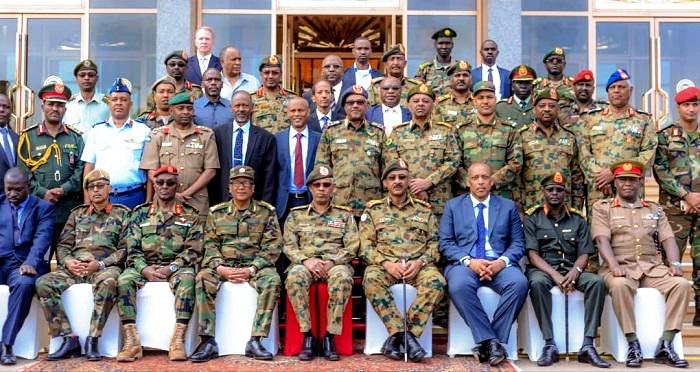IGAD military leaders decide to assess South Sudan’s security situation

October 22, 2018 (KHARTOUM) – In a meeting convened in Khartoum on Monday, the IGAD chiefs of staff discussed the deployment of the IGAG forces in South Sudan and decided to assess the needs on the ground before to take further steps.
In line with the outcome of the IGAD Summit of 12 September 2018 Djibouti, Somalia, Sudan and Uganda will deploy troops within the framework of the 4,000-troop Regional Protection Force (RPF) that the Security Council decided to deploy in South Sudan in support of the 13,000 UNMISS force.
The meeting of the IGAD military leaders was attended by the chiefs of staff of Ethiopia, Kenya, Djibouti, Somalia, South Sudan, Sudan and Uganda, in addition to the Rwandan army chief of staff as his country is chairing the current session of the African Union. Also, the Sudanese Defence minister addressed the one-day meeting.
A statement released after the meeting said the participants discussed the expansion of the regional force and assessed the status and duties of Regional Protection Force in light of the situation in South Sudan,
The meeting decided to form “a joint working group headed by Sudan, composed of representatives from all the countries participating in the Regional Protection Force, to assess the status of the Regional Protection Force on the ground and to submit its report on 19 November 2018 to the next meeting of the chiefs of staff In Ethiopia,” further said the statement.
In his speech, Sudan’s Defence Minister Awad Ibn Ouf pointed told the meeting that the situation in South Sudan impacts the whole regional security. He urged the South Sudanese parties to work together to maintain security and stability and to cooperate with the region to implement the outcomes of this meeting.
The South Sudanese army chief of staff, for his part, briefed the meeting on the overall security situation in his country.
Besides the protection of civilians, the IGAD troops will be tasked with the protection of the opposition leaders during the 30- month transitional period.
(ST)
